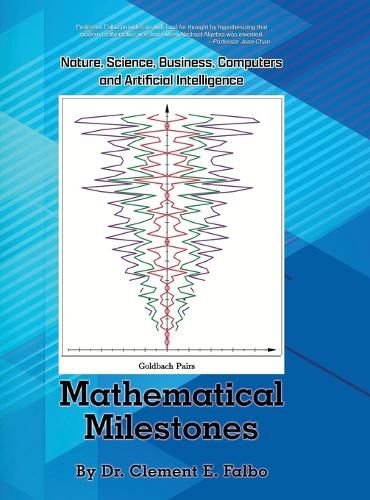Readings Newsletter
Become a Readings Member to make your shopping experience even easier.
Sign in or sign up for free!
You’re not far away from qualifying for FREE standard shipping within Australia
You’ve qualified for FREE standard shipping within Australia
The cart is loading…






This title is printed to order. This book may have been self-published. If so, we cannot guarantee the quality of the content. In the main most books will have gone through the editing process however some may not. We therefore suggest that you be aware of this before ordering this book. If in doubt check either the author or publisher’s details as we are unable to accept any returns unless they are faulty. Please contact us if you have any questions.
In his book, Mathematical Milestones, Professor Clement Falbo, PhD, shares many of the interesting historical anecdotes about mathematics. When Archimedes invented calculus in 250 BCE, like the first snows of winter, it didn't stick, when it was reinvented in the 17th century, it did stick because of its necessity in burgeoning world-wide industrial activity. This time, Rene Descartes (1630), Pierre De Fermat (1635), Bonaventura Cavalieri (1635), Isaac Newton, and Gottfried Leibnitz (1660) and (1670) were given credit. In Falbo's book we see how new inventions, discoveries and applications in science, engineering, and economics contributed to and benefited from mathematical growth. This book allows the reader to engage in the exciting axiom-and-theorem narrative that develops complex numbers, matrices, vectors, and quaternions, all in historical contexts. Professor Falbo provides us with food for thought by hypothesizing that modern mathematics was born when Abstract Algebra was invented, and Non-Euclidean Geometry was discovered in the 1800's. -Professor Jean Chan, Mathematics Department, Sonoma State University Anyone who reads this book will discover interesting new information and fresh perspectives on well- known ideas. The brief calculus chapter by Professor Falbo is exciting and vibrant and even has a proof of the fundamental theorem. A unique feature of this book is the way Clem traces the history of Game Theory and Operations Research from Jiuzhan Suanshu (300 BCE) in China to Seki Kawa (1683 CE) in Japan to Gauss and Jordan in Germany in the 19th Century all the way to Von Neumann, Morgenstern, and Dantzig in the 20th Century. His Chapters on matrix applications and operations research provide a readily accessible introduction to the powerful Simplex Algorithm. We can see where artificial intelligence originated from the sections of the book that explore logic and game theory. The chapter "A Crisis in Mathematics" in the books last section, describes how Kurt Godel, in 1931 destroyed mathematicians' dreams of having a discipline that was both comprehensive and consistent. -Professor Ken Ross, Mathematics Department, The University of Oregon
$9.00 standard shipping within Australia
FREE standard shipping within Australia for orders over $100.00
Express & International shipping calculated at checkout
This title is printed to order. This book may have been self-published. If so, we cannot guarantee the quality of the content. In the main most books will have gone through the editing process however some may not. We therefore suggest that you be aware of this before ordering this book. If in doubt check either the author or publisher’s details as we are unable to accept any returns unless they are faulty. Please contact us if you have any questions.
In his book, Mathematical Milestones, Professor Clement Falbo, PhD, shares many of the interesting historical anecdotes about mathematics. When Archimedes invented calculus in 250 BCE, like the first snows of winter, it didn't stick, when it was reinvented in the 17th century, it did stick because of its necessity in burgeoning world-wide industrial activity. This time, Rene Descartes (1630), Pierre De Fermat (1635), Bonaventura Cavalieri (1635), Isaac Newton, and Gottfried Leibnitz (1660) and (1670) were given credit. In Falbo's book we see how new inventions, discoveries and applications in science, engineering, and economics contributed to and benefited from mathematical growth. This book allows the reader to engage in the exciting axiom-and-theorem narrative that develops complex numbers, matrices, vectors, and quaternions, all in historical contexts. Professor Falbo provides us with food for thought by hypothesizing that modern mathematics was born when Abstract Algebra was invented, and Non-Euclidean Geometry was discovered in the 1800's. -Professor Jean Chan, Mathematics Department, Sonoma State University Anyone who reads this book will discover interesting new information and fresh perspectives on well- known ideas. The brief calculus chapter by Professor Falbo is exciting and vibrant and even has a proof of the fundamental theorem. A unique feature of this book is the way Clem traces the history of Game Theory and Operations Research from Jiuzhan Suanshu (300 BCE) in China to Seki Kawa (1683 CE) in Japan to Gauss and Jordan in Germany in the 19th Century all the way to Von Neumann, Morgenstern, and Dantzig in the 20th Century. His Chapters on matrix applications and operations research provide a readily accessible introduction to the powerful Simplex Algorithm. We can see where artificial intelligence originated from the sections of the book that explore logic and game theory. The chapter "A Crisis in Mathematics" in the books last section, describes how Kurt Godel, in 1931 destroyed mathematicians' dreams of having a discipline that was both comprehensive and consistent. -Professor Ken Ross, Mathematics Department, The University of Oregon